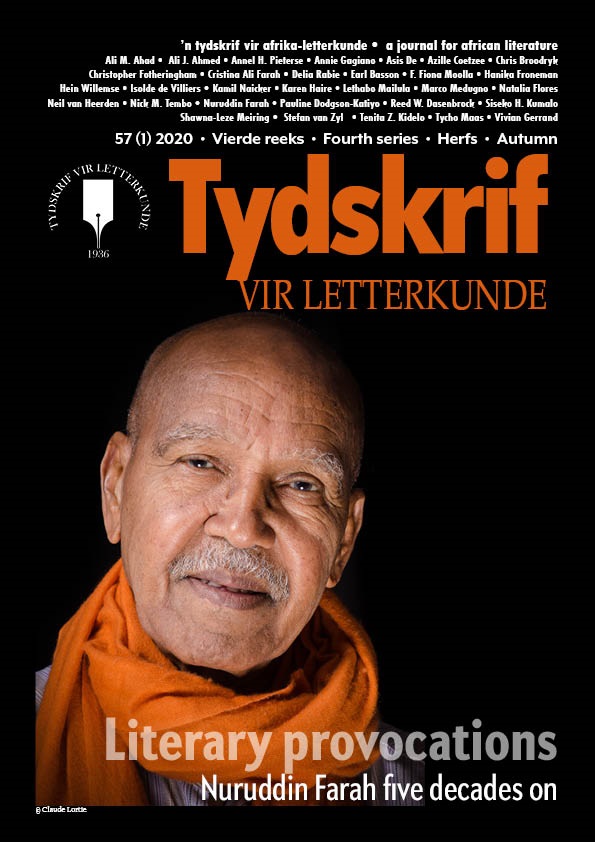Dante in Mogadishu: The Divine Comedy in Nuruddin Farah’s Links
DOI:
https://doi.org/10.17159/2309-9070/tvl.v.57i1.8060Keywords:
Farah, Dante, Mogadishu, intertextuality, re-contextualization, paratext, epigraphAbstract
This article aims to explore the complex network of intra-textual and intertextual references to Dante’s The Divine Comedy in Nuruddin Farah’s novel Links (2005). By analyzing the quotations from the poem, this essay wishes to show how the Comedy informs the novel at various levels, from the paratext (since Dante’s tercets from Inferno are chosen as an epigraph) to the text itself (since Inferno appears to be deeply constitutive of Links). The analysis then suggests that, on the one hand, Farah employs Dante’s poem to address, represent and understand the civil-war context of Somalia from the protagonist’s point of view. On the other, he subverts and re-contextualizes Inferno to create new meanings and to distance his novel from Dante’s literary antecedent. Therefore, by analyzing the practices of intertextuality between the two texts, this essay aims to investigate both the converging and conflicting strategies enabled in the novel.
Downloads
References
Abdi, A. Ali. “Education in Somalia: History, Destruction, and Calls for Reconstruction.” Comparative Education vol. 34, no. 3, 1998, pp. 327–40. DOI: https://doi.org/10.1080/03050069828171.
Alden, Patricia & Louis Tremaine. Nuruddin Farah. Twayne Publishers, 1999.
Alighieri, Dante. La Divina Commedia. Inferno, edited by Anna Maria Chiavacci Leonardi. Arnoldo Mondadori, 1991.
Barolini, Teodolinda. “Inferno 10: Love in Hell.” Digital Dante. digitaldante.columbia.edu/dante/divine-comedy/inferno/inferno-10/. Accessed 28 Apr. 2019.
Barolini, Teodolinda. “Inferno 14: We Are Our Own Hell: Sunt Lacrimae Rerum.” Digital Dante. digitaldante.columbia.edu/dante/divine-comedy/inferno/inferno-14/. Accessed 28 Apr. 2019.
Bystrom, Kerry. “Humanitarianism, Responsibility, Links, Knots.” Interventions vol. 16, no. 3, 2014, pp. 405–23. DOI: https://doi.org/10.1080/1369801x.2013.798141.
Casanova, Pascale. The World Republic of Letters. Trans M. B. DeBevoise. Harvard, 2004.
Dodgson-Katiyo, Pauline. “The Rubble & The Secret Sorrow”, Diaspora & Returns in Fiction, edited by Ernest N. Emenyonu and James Currey, 2016, pp. 67–81.
Eliot, T. S. “Ulysses, Order, and Myth.” The Dial vol. 75, 1923, pp. 480–83.
Farah, Nuruddin. Links. Duckworth, 2005.
Frow, John. “Intertextuality and Ontology.” Intertextuality. Theories and Practices, edited by Michael Worton and Judith Still. Manchester U P, 1990, pp. 46–55.
Garane, Garane. Il latte è buono. Cosmo Iannone, 2005.
Genette, Gérard. Paratexts: Thesholds of Interpretation. Trans. Jane E. Lewin. Cambridge U P, 1997.
Genette, Gérard. Palimpsests: Literature in the second degree. Trans. Channa Newman & Claude Doubinsky. U of Nebraska P, 1997.
Hobbes, Thomas. Leviathan. Routledge, 2008.
Mandelbaum, Allen. Introduction to the Divine Comedy of Dante Alighieri. Bantam, 1984.
Mari, Lorenzo. Forme dell’interregno: Past Imperfect di Nuruddin Farah tra letteratura Post-coloniale e World Literature. Aracne, 2018.
Masterson, John. The Disorder of Things: A Foucauldian Approach to the Work by Nuruddin Farah. Wits U P, 2013.
Moolla, F. Fiona. Reading Nuruddin Farah, The Individual, the Novel & the Idea of Home. James Currey, 2014.
Musa, Mark. Dante’s Inferno, The Indiana Critical Edition. Indiana U P, 1995.
Myers, Garth. African Cities: Alternative Visions of Urban Theory and Practice. Zed, 2011.
Mzali, Ines. “Wars of Representation: Metonymy and Nuruddin Farah’s Links.” College Literature vol. 37, no. 3, 2010, pp. 84–105. DOI: https://doi.org/10.1353/lit.0.0124.
Sapegno, Natalino. La Divina Commedia. Inferno. La Nuova Italia, 1993.
Downloads
Published
Issue
Section
License
Copyright (c) 2020 Tydskrif vir Letterkunde

This work is licensed under a Creative Commons Attribution-ShareAlike 4.0 International License.


 https://orcid.org/0000-0001-6465-6584
https://orcid.org/0000-0001-6465-6584


.png)